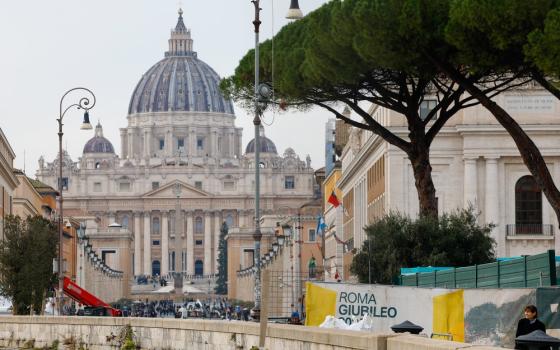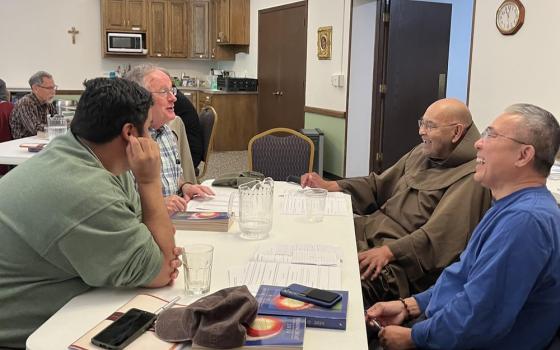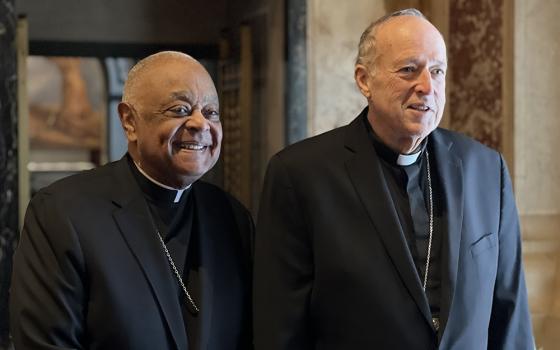
More documents have been discovered linking Pope Benedict to particular cases in the clergy sex abuse scandal, and other regions of the world are being drawn into the scandal. Meanwhile, supporters of the pope continue to defend his actions, with one calling Benedict "a coherent guide along the path of rigor and truth" and "a pastor well capable of facing -- with great rectitude and confidence -- this difficult time."
The Vatican also said Friday that the pope is ready to hold more meetings with victims of clerical sex abuse.
Friday afternoon, The Associated Press reported that it had obtained church files showing that before becoming pope, Cardinal Joseph Ratzinger resisted defrocking a California priest who molested children.
The AP story says "A 1985 letter signed by Ratzinger cited concerns about the effect that removing the priest would have on 'the good of the universal church.' "
The letter is part of years of correspondence between the diocese of Oakland and the Vatican about the proposed defrocking of Fr. Stephen Kiesle, the AP story said.
The case then languished for four years at the Vatican before Ratzinger finally wrote to Oakland Bishop John Cummins. It was two more years before Kiesle was removed.
In the November 1985 letter, Ratzinger says the arguments for removing Kiesle are of "grave significance" but added that such actions required very careful review and more time. He also urged the bishop to provide Kiesle with "as much paternal care as possible" while awaiting the decision …
But the future pope also noted that any decision to defrock Kiesle must take into account the "good of the universal church" and the "detriment that granting the dispensation can provoke within the community of Christ's faithful, particularly considering the young age." Kiesle was 38 at the time.
Jesuit Fr. Federico Lombardi, director of the Holy See Press Office, said Friday morning that "The pope has written that he is available for new meetings with [victims], taking the same path as the whole community of the church,"
Last month, in an open letter to Irish Catholics regarding the church's sex abuse crisis, Benedict recalled that "on several occasions since my election to the See of Peter, I have met with victims of sexual abuse, as indeed I am ready to do in the future."
"I have sat with them, I have listened to their stories, I have acknowledged their suffering, and I have prayed with them and for them," Benedict wrote. Over the last two years, Benedict has met with abuse victims from Australia, Canada and the United States.
Responding to widespread criticism of the pope and the Vatican for allegedly failing to act more decisively against priest abusers, Lombardi said the church's current policies of transparency and firmness reflected the pope's own determination to address the problem.
"Pope Benedict XVI, a coherent guide along the path of rigor and truth, merits all respect and support," Lombardi said. "He is a pastor well capable of facing -- with great rectitude and confidence -- this difficult time in which there is no lack of criticism and unfounded insinuations," he said.
Church leaders can learn from Pope Benedict "the constancy necessary to grow in truth and transparency" and to respond patiently to "the slow and gradual release of partial or presumed 'revelations' which seek to undermine his credibility," he said.
Latin America
As clergy sex abuse scandals in Europe made headlines worldwide, bishops in Latin America expressed support for Pope Benedict XVI. But observers say it is just a matter of time before the upheaval that has struck the United States and Europe hits Latin America.
A few cases of sexual abuse of minors by clergy already have surfaced. The most notorious is that of Father Marcial Maciel, founder of the Legionaries of Christ in Mexico, who died in 2008. Other cases have emerged in Argentina, Brazil and Chile, but there have been no widespread accusations.
Recent cases in Europe, and accusations that top church officials did not react quickly or strongly enough, have made headlines in Latin America, however, and observers say the region is not immune to the problem.
"Latin American countries are likely to have the same or more conflicts in this area as the rest of the world," said Jose Maria Poirier, editor of Criterio, a Catholic magazine published in Buenos Aires, Argentina.
Because of the historical importance of Catholicism in the region and the close relationship between church and state that persists in many countries, Poirier said, public reaction to widespread revelations of sex scandals, if they occur, could more closely resemble the reaction in Ireland than that of more secular societies, such as the United States and Western Europe.
The impact of news from Europe and criticism of the Vatican's handling of cases is already rippling through the region, according to Jesuit Father Antonio Delfau, editor of the Catholic magazine Mensaje in Santiago, Chile.
"The question is whether church leaders realize how devastating this has been for lay people," Father Delfau said. "Among young people, there has been a certain distancing from the church."
Some church leaders deny there has been such an effect. In an April 7 statement, Bishop Felipe Arizmendi Esquivel of San Cristobal de las Casas, Mexico, said, "During the days of Holy Week, multitudes have thronged our churches, more than in other years. ... If they distrusted the church, they would not approach priests to bare their consciences and find pardon and peace" in the sacrament of reconciliation.
The Council of Bishops of Latin America and the Caribbean and the Peruvian and Venezuelan bishops' conferences issued statements or wrote letters to the Vatican supporting the pope and criticizing what they called unfair attacks on his handling of sex abuse cases in the past.
India
Leaders of the Indian bishops' conference will discuss guidelines for handling allegations of clerical sexual abuse and disciplining priests during an April 25 meeting, Cardinal Oswald Gracias of Bombay said.
The discussion will occur among members of the standing committee of the Catholic Bishops' Conference of India and will include archbishops from throughout the country and the heads of various conference commissions and church-run centers, reported the Asian church news agency UCA News.
Cardinal Gracias, who was elected bishops' conference president in March, told UCA News that his top priority at the meeting will be to draft the guidelines, which would be binding in all dioceses in India.
Media reports about an Indian priest charged with child abuse by U.S. authorities have rattled the Indian church. Some commentators have accused the Indian church of sheltering Father Joseph Palanivel Jeyapaul, 52, who now works in the Diocese of Ootacamund in southern India.
The priest is accused of sexually molesting two teenage girls while working in Minnesota from 2004 to 2005.
A Roseau County, Minn., prosecutor confirmed that she has been trying to extradite Father Jeyapaul to face two counts of criminal sexual conduct stemming from allegations of sexual assault by a girl who was 14 and 15 at the time of the events. Apparently no charges have been filed related to the alleged incident involving the second girl, who was 16 at the time.
Jeyapaul has said he is innocent but would return to the U.S. to stand trial if called to do so.
Cardinal Gracias said the reports were of "very stray cases" and aimed at damaging the church's "good image" in India.
"They are not at all widespread," he added, saying the church would nevertheless take all steps to curb them.
Novena
The U.S.-based Catholic fraternal order, the Knights of Columbus, is encouraging members worldwide to join in a special novena for Pope Benedict. The novena is to begin on Divine Mercy Sunday, April 11, and conclude Monday, April 19, the fifth anniversary of Benedict's election as pope in 2005.
A notice from the Knights of Columbus says, "We pray for the pope and for his pastoral mission, asking God to protect, strengthen and uplift our beloved Holy Father at this time of considerable challenge."


